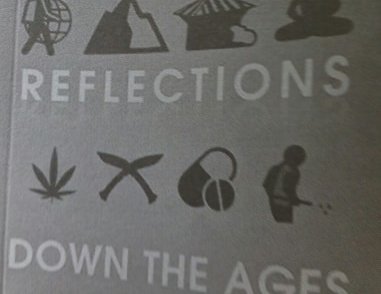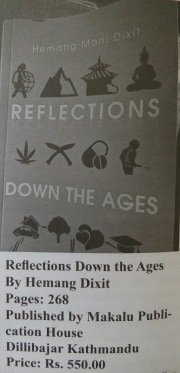
As Confucius says, past directs persons to achieve better results in the future. Passing knowledge and sharing experiences enrich the society and new generation.
In societies, including India, people of various professions write books after their retirement. However, only a few of them can share their authentic experiences and encounters.
In his recent book, Dixit collected the memory of different periods of Nepal, including the latest COVID-19 crisis and its implications. Touching on experiences from Rana’s period to Nepal’s geography, culture, society and international exposure, the book provides insights into Nepal’s changing scenario.
Ramesh Kant Adhikari, professor and former dean of institute of medicine writes, “The present volume, Reflections Down the Ages, reads like summary of what he had been experiencing and reflecting on throughout his working life. It is a culmination of his work over the last six decades or so. It is a both memoir and collection of essays on various topics. His treatment of different issues reflects views of common man swayed by conspiracy theories and fake news as well those of an insider who has access to the powerful. Thus, opinions are helpful to put the understanding in proper perspective and very educational.”
Writing starts with a specific experience followed by his reflections on the implications or the ramifications of the experience and ends with his opinions or suggestions. Sometimes, the experiences seem overwhelming and with too many diverse implications.
Hemang Mani Dixit is among a few people who have greatly enriched the society by publishing various books and articles on contemporary issues.
Born in 1937 in Kathmandu and educated at Shrewood College, Nainital and Bishop Cotton School Shimla in India, Dixit went to the U.K. to study medicine. He did so at the Charing Cross Hospital Medical School on the strand in London qualifying in 1961.
Since Nepal has gone through several phases from being a traditional isolated society to current modern and exposed one, Dixit is a witness to so many changes.
Although he is professionally a medical doctor, he has the passion to write and writing is his inborn quality. Starting the writing career as the chief editor of the Journal of Nepal Medical Association in 1965/68, Dixit went to become the chief editor of the journal of Institute of Medicine from 1983 to 1992.

As a writer to have published fictions and non-fiction books and write-ups, Dixit knows how to present all kinds of events and changes in interesting manner. This is what one can see in this book.
Divided into five different chapters, the book starts from Nepalian, old time, present time, future time and afterword.
Writing reflections of the past is not an easy task, one needs to visualize the collections of memory in sequences. Having published a number of books and numerous articles on contemporary issues, Hemang Dixit, a prolific writer, has accomplished the task very well in the new book showcasing his vast memories of Nepal.
Author Dixit writes, “Our country is unique in the sense that we are a nation. Apart from that our forefathers used to say Ajab, Kashmir gazaab Nepal. It is part of our heritage. We are also extraordinary in the sense that we are a nation damned. It was the wife of Bhimsen Thapa who whilst proceeding to Kashi reached the rim of the valley, looked back to what was then referred to as Nepal and damned every one of her detractors. This country from this time has been said to be a “country cursed by Sati.”
These words of author Dixit show how he has tried to describe Nepal’s own culture and values narrating the society. In a sense, this book gives readers vivid pictures of Nepal. Written in simple English with short sentences, every page is more interesting than the earlier one.
This book is useful for all generations, particularly for new generations, who will get a glimpse of Nepalese society and culture. Dixit has again proved himself as a prolific writer to explain the society through his own experiences and knowledge.
- FOREIGN EXCHANGE: Largest Deposit
- Jul 22, 2024
- IMF: Approval Of SDR
- Jul 22, 2024
- NEPAL-KOREA RELATIONS: Fifty-Years Of Warm Relations
- May 31, 2024
- NEPAL-BRITAIN: Centenary Celebration
- May 31, 2024
- POLITCS: Forming New Alliances
- May 27, 2024
















